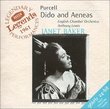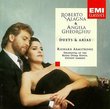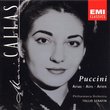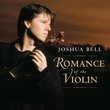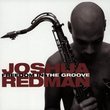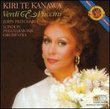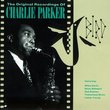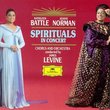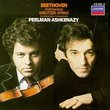| All Artists: Carl Loewe, Felix Mendelssohn, Franz Schubert, Robert Schumann, Richard Strauss, Hugo Wolf, Hamilton Harty, Thomas Quasthoff, Justus Zeyen Title: A Romantic Songbook Members Wishing: 0 Total Copies: 1 Label: Deutsche Grammophon Release Date: 5/11/2004 Genres: Special Interest, Pop, Classical Styles: Vocal Pop, Opera & Classical Vocal, Historical Periods, Classical (c.1770-1830) Number of Discs: 1 SwapaCD Credits: 1 UPC: 028947450122 |
Search - Carl Loewe, Felix Mendelssohn, Franz Schubert :: A Romantic Songbook
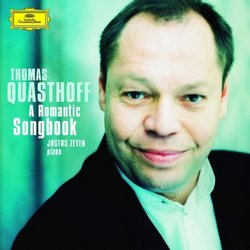 | Carl Loewe, Felix Mendelssohn, Franz Schubert A Romantic Songbook Genres: Special Interest, Pop, Classical
Thomas Quasthoff is unique as singer and artist. His voice, always astonishingly powerful, has over the years acquired an ever-growing warmth, purity, range, and expressiveness, and his extraordinary wealth of dynamics, co... more » ![header=[] body=[This CD is available to be requested as disc only.]](/images/attributes/disc.png?v=0aa29d24) ![header=[] body=[This CD is available to be requested with the disc and back insert.]](/images/attributes/disc_back.png?v=0aa29d24) ![header=[] body=[This CD is available to be requested with the disc and front insert.]](/images/attributes/disc_front.png?v=0aa29d24) ![header=[] body=[This CD is available to be requested with the disc, front and back inserts.]](/images/attributes/disc_front_back.png?v=0aa29d24) |
Larger Image |
CD DetailsSynopsis
Amazon.com Thomas Quasthoff is unique as singer and artist. His voice, always astonishingly powerful, has over the years acquired an ever-growing warmth, purity, range, and expressiveness, and his extraordinary wealth of dynamics, colors, nuances, and inflections is truly amazing. He uses these for instant changes of mood and atmosphere, while his seemingly unlimited breath control lets him spin endless lines and phrases. In these songs, all these qualities are on full display; indeed, Quasthoff admits choosing them with this in mind. However, the program is beautiful, judiciously varied and contrasted, combining popular favorites like Schubert's "Trout" and "Heidenröslein" with unfamiliar gems by his unjustly forgotten contemporary Carl Loewe, who wrote hundreds of splendid ballads. Of special interest are two very different settings of the same Ludwig Uhland poem, "Frühlingsglaube" ("Faith in Spring"), one by a very young Mendelssohn, the other by a mature Schubert. The former overflows with youthful exuberance, joyousness, and ecstasy; the latter breathes lyrical serenity. In a rather unusual reading, Quasthoff starts it with a sense of tremulously hopeful anticipation, gradually becoming more confident and finally blossoming out into radiant affirmation. Otherwise, the Schubert group is least convincing: always sensitive to the fusion of text and music, Quasthoff, perhaps seduced by the resources of his vocal palette, indulges in fussy, excessive "word-painting" and loses the songs' essential simplicity. However, in the more complex, dramatic, declamatory songs, this works wonderfully. Loewe's ballads, in which he impersonates three distinct characters, and Schumann's "Belsatzar" become veritable operas, and he regains a moving simplicity in the more lyrical songs, like Mendelssohn's "On Wings of Song" and a Strauss group. Justus Zeyden is an exemplary collaborator, but even he is defeated by the long sustained notes in Strauss' "Morgen!" where the violin obbligato is sadly missing. In "Danny Boy," Quasthoff turns himself into a very persuasive American-style crooner. --Edith Eisler Similarly Requested CDs
|
CD ReviewsQuasthoff's best release to date Yuval Sharon | Brooklyn, NY | 05/12/2004 (5 out of 5 stars) "I may just be a sucker for these songs, but I really think this is the best solo recording Quasthoff has made so far: some of his other recordings suffer from an improper balance between piano and voice (like his WINTERREISE or SCHWANENGESANG), but here, Justus Zeyen's contribution feels an equal partner; each interpretation is fresh and vivacious; and the program is put together well. This is also the first time I've felt a recording comes close to the electric experience of hearing Quasthoff live; the sound quality captures everything very intimately.Then again, this might be my personal love of these song talking. One review I've read of this recording refers to it condescendingly as a "Lieder's greatest hits" CD with "all dessert and no meat". But who cares: Schubert's "Im Fruehling" and "Ungeduld"; Schumann's "Belsatzar," "Widmung," and "Du bist wie eine Blume"; and Strauss' "Zueignung" and "Morgen!" are at the top of my list of favorite songs of all time, and to have them all sung so beautifully on one CD makes this a great CD for me. Plus, these "greatest hits" are also songs that ideally suit Quasthoff's artistry--so what's wrong with a CD that shows a singer's mastery in this repertoire?" Quasthoff at his most inspiring Santa Fe Listener | Santa Fe, NM USA | 05/17/2004 (5 out of 5 stars) "Thomas Quasthoff has set the highest standards for himself in lieder singing, challenging the dominance, on records, of Schwarzkopf and Fischer-Dieskau. Here he seems to soar even above those exalted artists, because of his thrilling range, total commitment, deep insisght, and complete lack of artifical "personality." The arc of his mastery has risen from his fine RCA years to reach this peak, and now he has no one to surpass but himself. It's a humbling experience to hear an artist of this greatness...perhaps the last living exemplar of a great German singing tradition.
special mention must be made to his pianist, Justus Zeyen, who stands with Malcolm Martineau as the best accompanist on the current scene. How doubling satisfying that they have formed such a great partnership." |

 Track Listings (24) - Disc #1
Track Listings (24) - Disc #1
